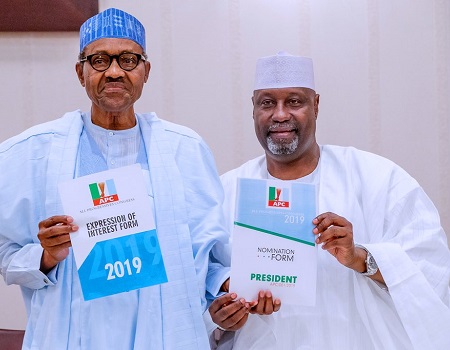There are no products in your shopping cart.
| 0 Items | £0.00 |

 AMERICAN political analyst Teneo Intelligence has predicted that President Muhammadu Buhari could lose the 2019 election after his All Progressives Congress (APC) suffered a serious setback in the recent Osun State gubernatorial elections.
AMERICAN political analyst Teneo Intelligence has predicted that President Muhammadu Buhari could lose the 2019 election after his All Progressives Congress (APC) suffered a serious setback in the recent Osun State gubernatorial elections.
Last Saturday, Osun State went to the polls to elect a new governor and in what was a cliff-hanger of an election, Senator Ademola Adeleke of the Peoples Democratic Party (PDP) secured 254,698 votes, while Alhaji Gboyega Oyetola of the APC got 254,345 votes. Nigeria's Independent National Electoral Commission (Inec), declared the result inconclusive because it had cancelled 3,498 votes in seven polling units located in Osogbo, Orolu, Ife North and Ife South local government areas as a result of irregularities.
A re-run is due in these polling units on Thursday but already the result was a big humiliation for the APC who are the party in power both at the federal level and in Osun State. In a surprise outcome, Senator Adeleke and the PDP swept the polls in their strongholds like Ede and split the vote in APC strongholds like Osogbo and Ilesha, where incumbent governor Rauf Aregbesola is from.
In a report obtained by Bloomberg, the intelligence firm said if the opposition manages to unite, February's election would be a tough one for the ruling APC. President Buhari is facing s stiff challenge as his government has become very unpopular due to growing insecurity, a failure to create jobs and limited economic growth.
Malte Liewerscheidt, an analyst at Teneo, said: “There is already a clear message sent from Osun State. Provided the PDP remains united and the vote is reasonably free and fair, Buhari and his APC are likely to lose the general election,”
HSBC Bank, a global financial organisation, had earlier predicted that President Buhari may lose next year and that Nigeria’s economy will take a downturn if he wins in 2019. HSBC said the government's economic policies are not popular with the electorate.
In its report titled Nigeria: Papering Over The Cracks, HSBC said: “A second term for Mr Buhari, however, raises the risk of limited economic progress and further fiscal deterioration, prolonging the stagnation of his first term, particularly if there is no move towards completing reform of the exchange rate system or fiscal adjustments that diversify government revenues away from oil. In the near term, however, the election impact is likely to be negative as increased political uncertainty precludes policy reforms, weighs on confidence, deters investment spending and restrains the growth outlook.”